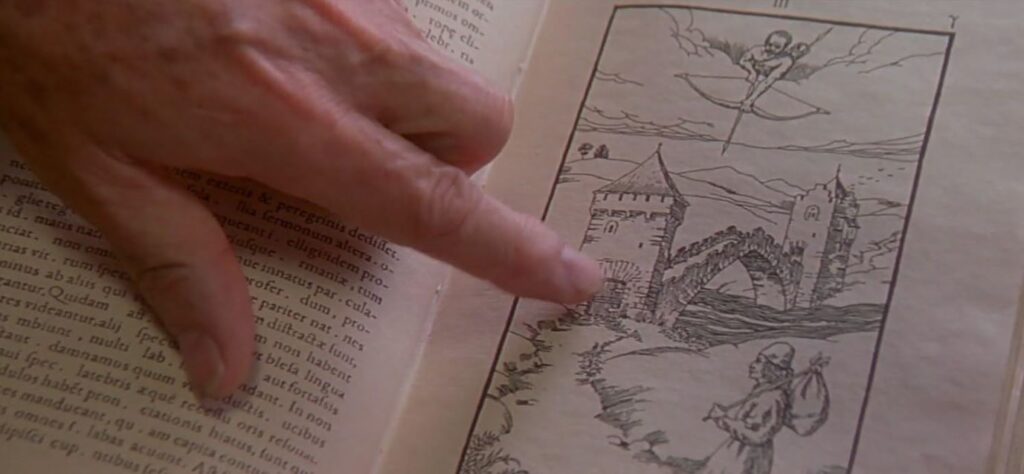
In the grand universe of horror/mystery tropes, the most hoary and venerable must be: Start it with an old dude hanging himself. The viewer is instantly gripped: why-oh-why did this dignified gentleman find it necessary to end himself in such tragic and, let’s face it, ‘bowel-loosening’ manner (because that’s what they find the next morning, they never show you that part, the Guatemalan maid walking into the study, looking up in horror , then looking down, face curling in disgust because, as she sputters to the police over the phone, ‘Meester Caruthers hung hisself, and poo-poo’s all over di floor! Hees cuvered in poo-poo!’
That’s how Roman Polanski’s The Ninth Gate began (minus the poo-poo) and no matter how many times I’ve seen this opening, I still get caught up by it: we see the old man hang himself after writing a letter and leaving it on his desk blotter (natch), then from dangling feet the camera pans over his tremendous collection of old, leather-bound books and settles on a point in the stacks where one book is missing.
Cue musical sting: dun-dun-DUHN.
It never gets old.
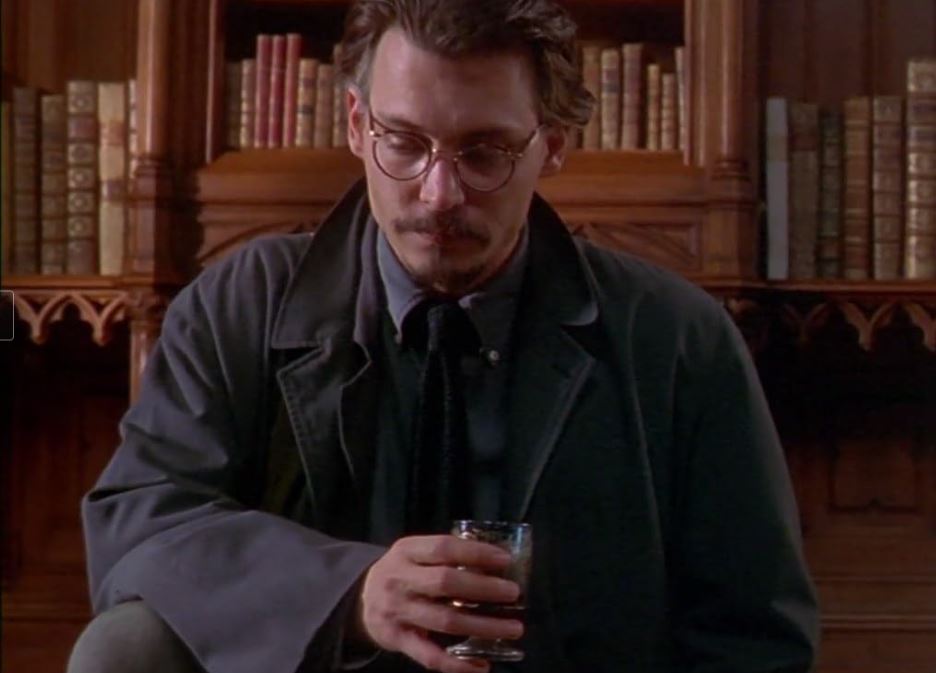
Our hero, Mr. Corso (Johnny Depp), if ‘hero’ he can be called, is a book dealer, a rare book dealer, a vary-old-very-valuable book dealer the kind of which only three exist in a city and only fifty are known world-wide (you ever get the feeling that screenwriters are inventing these super-specialized people just for dramatic effect?–Of course not, I know they wouldn’t just will a certain kind of professional into existence to cynically produce false tension. I feel silly, now. Forgive me.) Corso serves a clientele of studious New York codgers, each trying to one-up each other and fatten their priceless collections. Corso, we discover, has no compunction taking advantage of a wheelchair bound man, through his greedy children, to snag a four volume set of Don Quixote for four grand so he can resell it for four hundred. Because that’s how we meet him. In full hearing of this stroke-palsied father, Corso hustles his dumb kids out of their inheritance.
“Unscrupulous!” screams his competitor on the way into the old man’s building, “Completely unscrupulous!” Corso gives him a look that says bite-me-you-bald-fag as he steps, unburdened, into daylight.
He is summoned to attend a talk by a professor that specializes in witchcraft, as he leads Corso to his private office he remarks “You’re one of the lean, restless types that put the wind-up Julius Caesar. Men who stab their friends in the back, not that I suspect you have many friends. Your kind seldom does.”
“That makes two of us.”
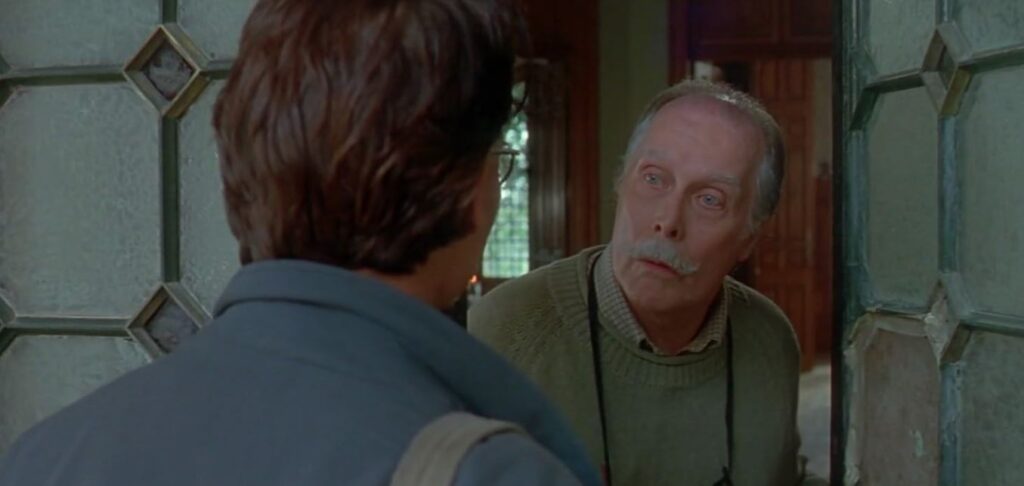
Because this silver-streaked gentleman (think Keith Olberman but smart and, even though a denizen of evil bent on satanic chaos, possessing more dignity) is, in fact, a witch, one of those aristocratic uber-witches that bankrolled the IMF and invented 5G only to meet in the redwoods every year to laugh at each other as they drop bing cherries into a martini glass using their butt-cheeks. You know. Those guys.
And this scholastic creep, whom, in this review, we’ll just call ‘Professor Weird’ wants Corso to find two copies of a book. He recently bought the third and last copy from another collector who, tragically, happened to hang himself that morning (duhn-duhn-DUHN). The task set before Corso is to find the books, and most importantly, to examine and document the differences in the lithographs—because in each copy they are different.
Prof Weird goes on to explain that the actual, unaltered lithographs, when put together, give witches a spell that will, well, summon a certain somebody from a certain fiery someplace so he can cause certain apocalypses and foil biblical something-or-others. Prof. Weird gives his copy to Corso with the strict instructions to find the other lithographs so he and his buddies can go into the redwoods and make smores and sing Camp-town Races.
Cue sexy widow… The old man that killed himself was Corso’s first stop, or, more accurately, his loyal, virginal bride. [I wrote that wrong, excuse me, I’ll do it again:] ‘Trophy wife’ doesn’t begin to describe this cooze. She didn’t know her husband sold it, and she’s visibly put out, but that doesn’t stop her from psychically blowing Corso with her eyes. She plays the graceful host, asks benign questions about his job, and then promptly swallows him up in her giant vagina.
Some decorum, madam, your husband’s suicide poo is still warm!
She shows up at his place, turns out this orgasm-made-flesh wasn’t interested in Corso at all, why all she wanted was the book, maybe the first 911 men you had sex with were just practice, but the 912th had to mean something, right?!
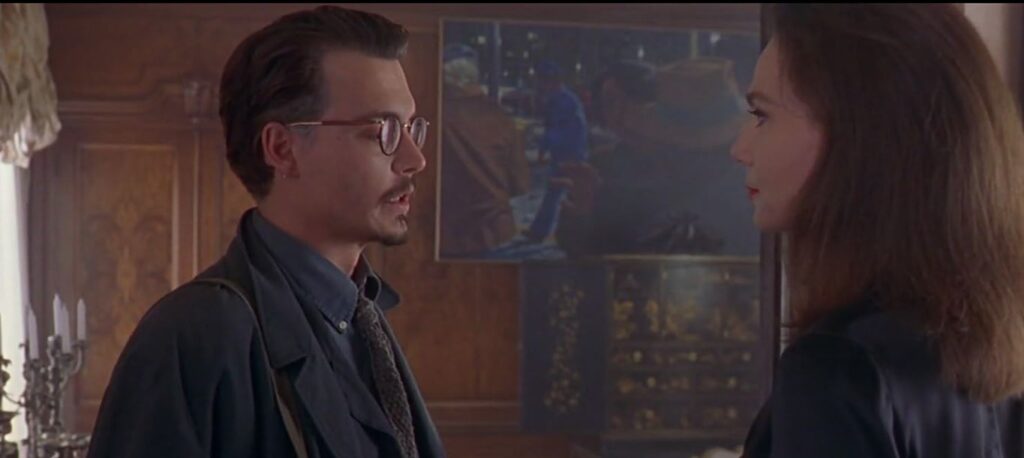
Poor Corso. She wakes up before him and gives him a smackdown in her nightgown while looking for the book (there’s a metaphor there about the human sexual power dynamic, it’s small, subtle, but it crystallized for me after that third post-coital dropkick.)
She finds zilch because he hid the book with a buddy. He comes to collect it and his buddy’s dead. He finds the book hidden in a secret panel, he comes home with it and his apartment is confetti.
He’ll take the job! (said nobody ever, even for money.)
In Europe, he finds a copy of the book with an old man in an old Chalet, and the old man won’t let him take it but will let him look at it. Corso takes notes and comes back the next day. But the next day the old man’s floating face down in a fountain. Co-inky-dink?
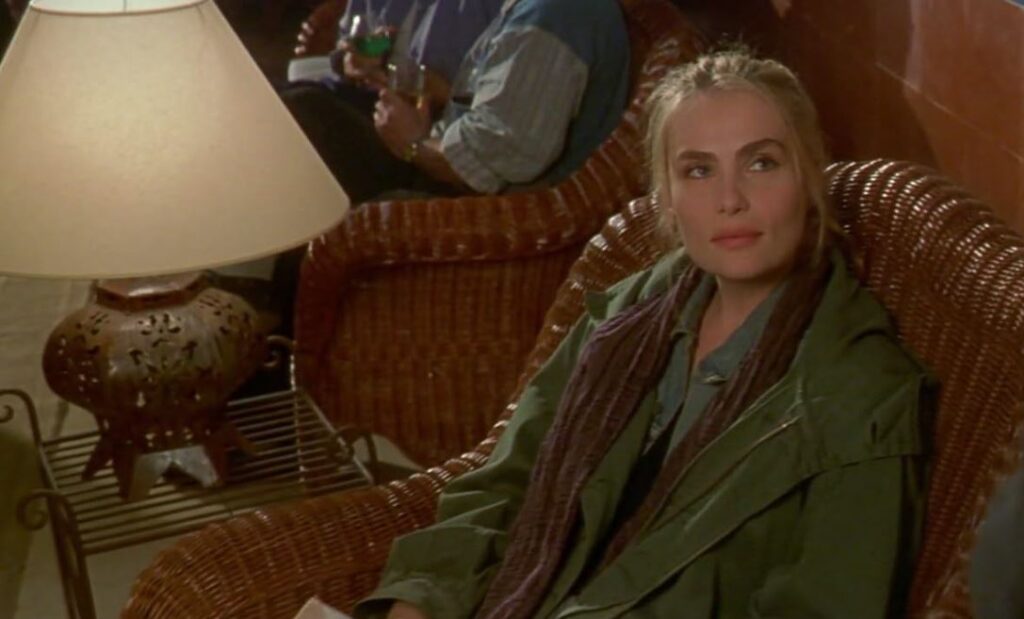
He meets a beautiful blonde (cuz why not) they pal around, they get chased, she reveals she knows all about the book, and she’s there to help him, for some reason this doesn’t bother Corso, and together they track the book to an old German woman who knew both the first dead man and the second dead man. Small world. She lets him study the lithographs until she figures out he was sent by Prof Weird, then she promptly kicks him out.
He comes back the next day and her building’s on fire, and she’s dead. This is the whole movie..and it still works. The film seemingly cost nothing to make: the sets are obviously sets, the outside shots are brief, and I’m guessing done without permit because they’re all rural road shots, there’s one actual location, and you could tell they only paid to film the outside of it.
And it still works.
The directing at times was so bad I thought 1) It was directed by a student and Polanski’s name was just slapped on it as a marketing gimmick or 2) Polanski gave direction by never looking at the actors and guided their performance over his shoulder with an Etch-a-Sketch,–because HOW! did he think it was cool that every member of the cast, save Depp and Prof Weird, was imitating the actors in a 1950 anti-marijuana public education film.
Quick test: List as many descriptors of the performances in the movie as you can in five seconds. Go!
Uh….’ Over-the-top.’
Yes.
‘Clown-like.’
Good.
‘Evocative of an uncle role-playing his favorite scene from
Star Wars at Thanksgiving….again.’
Also, good.
BUZZ!
And it still works.
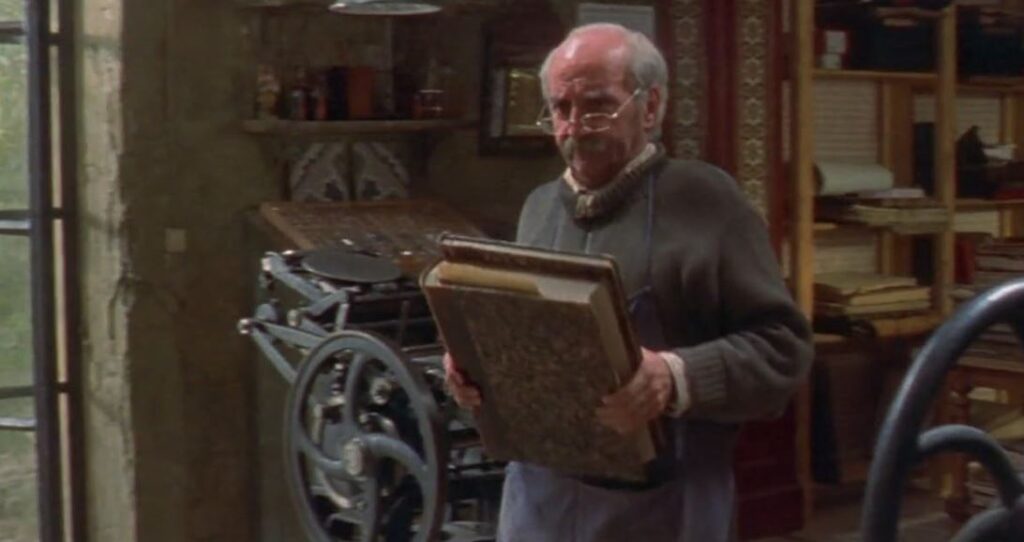
The story barely makes sense, the lithographs are switched around in the books, but the original witch was burned and all you have to do is find the one with LCH and that is Satan because he drew them, but the witch changed them, and for some reason there’s a black guy with blonde hair chasing them and now there’s a castle and everyone who was there is now here, and they’re naked.
And you’re still invested.
It baffles me as to how this b-level horror (not even B, this is C-reel, the type studios would charge a penny to project on the back wall of a Woolworth’s) is actually engaging, I care that Corso is in danger, I am curious about the blonde lady, I am shocked at the twist ending, and I am rendered contemplative by the potential meaning of the film.
But I shouldn’t.
Is it particularly scary? No. It’s more of a mystery and the idea that he’s being helped, and that help is supernatural and yet that supernatural help is not necessarily good, is a chewy prospect and fits perfectly in the detective flick this actually is. And the object of the mystery (I’ve heard it called the ‘Grand Grimoire’ in some movies, the ‘Magnus Malificarum’ in books, the ‘Necronomicon’ according to Lovecraft, otherwise the Liber Diabolae—here it’s called the ‘Nine Gates of the Kingdom of Shadows’) is itself a horror trope I never tire of, that mythical book written or dictated by Satan to some medieval witch in France or Sprain or Portugal or wherever, tales differ.
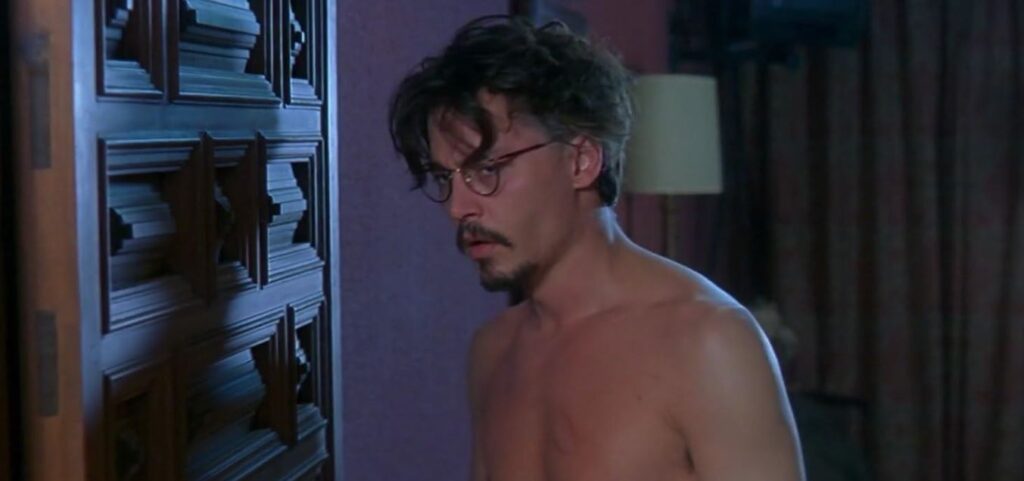
Depp is a good Corso, but I struggle to imagine a bad Corso because the character is straight film noir distillate, he’s an off-the-shelf, highly concentrated misanthrope-bachelor-bullshitter archetype…but I wasn’t bored with it and Depp’s misanthrope-bachelor-bullshitter still makes me interested anew even though I’ve met him a thousand times.
I don’t want to like this movie because I’m confused as to why I like it. It’s a very comfortable mystery without being feminine. Maybe that’s it, it’s Murder She Wrote if Angela Lansbury was played by Alan Ladd.
So, I recommend it.
Reluctantly.
Mysteriously.
Confusingly.
I really like it, and I’ve watched it a dozen times since it came out, and though it’s a completely unrelated film in every way, it shares a place with Four Rooms as one of my ‘rainy day’ films, a movie I’ll always enjoy and can eat a meal to on those days I have no chores and no work and no one’s in the house and I just want to bleh.
Should you watch it if you want to be scared? No. You should watch it because it will never cease to entertain—if only with the mystery of why it’s so entertaining– –and it’s raining.
Those kinds of movies are rare.
Leave a Reply